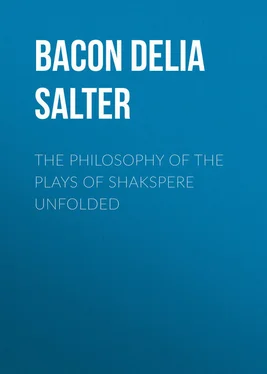Delia Bacon - The Philosophy of the Plays of Shakspere Unfolded
Здесь есть возможность читать онлайн «Delia Bacon - The Philosophy of the Plays of Shakspere Unfolded» — ознакомительный отрывок электронной книги совершенно бесплатно, а после прочтения отрывка купить полную версию. В некоторых случаях можно слушать аудио, скачать через торрент в формате fb2 и присутствует краткое содержание. Жанр: literature_19, foreign_antique, foreign_prose, на английском языке. Описание произведения, (предисловие) а так же отзывы посетителей доступны на портале библиотеки ЛибКат.
- Название:The Philosophy of the Plays of Shakspere Unfolded
- Автор:
- Жанр:
- Год:неизвестен
- ISBN:нет данных
- Рейтинг книги:3 / 5. Голосов: 1
-
Избранное:Добавить в избранное
- Отзывы:
-
Ваша оценка:
- 60
- 1
- 2
- 3
- 4
- 5
The Philosophy of the Plays of Shakspere Unfolded: краткое содержание, описание и аннотация
Предлагаем к чтению аннотацию, описание, краткое содержание или предисловие (зависит от того, что написал сам автор книги «The Philosophy of the Plays of Shakspere Unfolded»). Если вы не нашли необходимую информацию о книге — напишите в комментариях, мы постараемся отыскать её.
The Philosophy of the Plays of Shakspere Unfolded — читать онлайн ознакомительный отрывок
Ниже представлен текст книги, разбитый по страницам. Система сохранения места последней прочитанной страницы, позволяет с удобством читать онлайн бесплатно книгу «The Philosophy of the Plays of Shakspere Unfolded», без необходимости каждый раз заново искать на чём Вы остановились. Поставьте закладку, и сможете в любой момент перейти на страницу, на которой закончили чтение.
Интервал:
Закладка:
'The great secret of the Elizabethan Age was inextricably reserved by the founders of a new learning, the prophetic and more nobly gifted minds of a new and nobler race of men, for a research that should test the mind of the discoverer, and frame and subordinate it to that so sleepless and indomitable purpose of the prophetic aspiration. It was "the device" by which they undertook to live again in the ages in which their achievements and triumphs were forecast, and to come forth and rule again, not in one mind, not in the few, not in the many, but in all. "For there is no throne like that throne in the thoughts of men," which the ambition of these men climbed and compassed.
'The principal works of the Elizabethan Philosophy, those in which the new method of learning was practically applied to the noblest subjects, were presented to the world in the form of AN ENIGMA. It was a form well fitted to divert inquiry, and baffle even the research of the scholar for a time; but one calculated to provoke the philosophic curiosity, and one which would inevitably command a research that could end only with the true solution. That solution was reserved for one who would recognise, at last, in the disguise of the great impersonal teacher, the disguise of a new learning. It waited for the reader who would observe, at last, those thick-strewn scientific clues, those thick-crowding enigmas, those perpetual beckonings from the "theatre" into the judicial palace of the mind. It was reserved for the student who would recognise, at last, the mind that was seeking so perseveringly to whisper its tale of outrage, and "the secrets it was forbid." It waited for one who would answer, at last, that philosophic challenge, and say, "Go on, I'll follow thee!" It was reserved for one who would count years as days, for the love of the truth it hid; who would never turn back on the long road of initiation, though all "THE IDOLS" must be left behind in its stages; who would never stop until it stopped in that new cave of Apollo, where the handwriting on the wall spells anew the old Delphic motto, and publishes the word that " unties the spell."
On this object, which she conceives so loftily, the author has bestowed the solitary and self-sustained toil of many years. The volume now before the reader, together with the historical demonstration which it pre-supposes, is the product of a most faithful and conscientious labour, and a truly heroic devotion of intellect and heart. No man or woman has ever thought or written more sincerely than the author of this book. She has given nothing less than her life to the work. And, as if for the greater trial of her constancy, her theory was divulged, some time ago, in so partial and unsatisfactory a manner – with so exceedingly imperfect a statement of its claims – as to put her at great disadvantage before the world. A single article from her pen, purporting to be the first of a series, appeared in an American Magazine; but unexpected obstacles prevented the further publication in that form, after enough had been done to assail the prejudices of the public, but far too little to gain its sympathy. Another evil followed. An English writer (in a 'Letter to the Earl of Ellesmere,' published within a few months past) has thought it not inconsistent with the fair-play, on which his country prides itself, to take to himself this lady's theory, and favour the public with it as his own original conception, without allusion to the author's prior claim. In reference to this pamphlet, she generously says: —
'This has not been a selfish enterprise. It is not a personal concern. It is a discovery which belongs not to an individual, and not to a people. Its fields are wide enough and rich enough for us all; and he that has no work, and whoso will, let him come and labour in them. The field is the world's; and the world's work henceforth is in it. So that it be known in its real comprehension, in its true relations to the weal of the world, what matters it? So that the truth, which is dearer than all the rest – which abides with us when all others leave us, dearest then – so that the truth, which is neither yours nor mine, but yours and mine, be known, loved, honoured, emancipated, mitred, crowned, adored — who loses anything, that does not find it.' 'And what matters it,' says the philosophic wisdom, speaking in the abstract, 'what name it is proclaimed in, and what letters of the alphabet we know it by? – what matter is it, so that they spell the name that is good for ALL, and good for each ,' – for that is the REAL name here?
Speaking on the author's behalf, however, I am not entitled to imitate her magnanimity; and, therefore, hope that the writer of the pamphlet will disclaim any purpose of assuming to himself, on the ground of a slight and superficial performance, the result which she has attained at the cost of many toils and sacrifices.
And now, at length, after many delays and discouragements, the work comes forth. It had been the author's original purpose to publish it in America; for she wished her own country to have the glory of solving the enigma of those mighty dramas, and thus adding a new and higher value to the loftiest productions of the English mind. It seemed to her most fit and desirable, that America – having received so much from England, and returned so little – should do what remained to be done towards rendering this great legacy available, as its authors meant it to be, to all future time. This purpose was frustrated; and it will be seen in what spirit she acquiesces.
'The author was forced to bring it back, and contribute it to the literature of the country from which it was derived, and to which it essentially and inseparably belongs. It was written, every word of it, on English ground, in the midst of the old familiar scenes and household names, that even in our nursery songs revive the dear ancestral memories; those "royal pursuivants" with which our mother-land still follows and retakes her own. It was written in the land of our old kings and queens, and in the land of our own PHILOSOPHERS and POETS also. It was written on the spot where the works it unlocks were written, and in the perpetual presence of the English mind; the mind that spoke before in the cultured few, and that speaks to-day in the cultured many. And it is now at last, after so long a time – after all, as it should be – the English press that prints it. It is the scientific English press, with those old gags (wherewith our kings and queens sought to stop it, ere they knew what it was) champed asunder, ground to powder, and with its last Elizabethan shackle shaken off, that restores, "in a better hour," the torn and garbled science committed to it, and gives back "the bread cast on its sure waters."'
There remains little more for me to say. I am not the editor of this work; nor can I consider myself fairly entitled to the honor (which, if I deserved it, I should feel to be a very high as well as a perilous one) of seeing my name associated with the author's on the title-page. My object has been merely to speak a few words, which might, perhaps, serve the purpose of placing my countrywoman upon a ground of amicable understanding with the public. She has a vast preliminary difficulty to encounter. The first feeling of every reader must be one of absolute repugnance towards a person who seeks to tear out of the Anglo-Saxon heart the name which for ages it has held dearest, and to substitute another name, or names, to which the settled belief of the world has long assigned a very different position. What I claim for this work is, that the ability employed in its composition has been worthy of its great subject, and well employed for our intellectual interests, whatever judgment the public may pass upon the questions discussed. And, after listening to the author's interpretation of the Plays, and seeing how wide a scope she assigns to them, how high a purpose, and what richness of inner meaning, the thoughtful reader will hardly return again – not wholly, at all events – to the common view of them and of their author. It is for the public to say whether my countrywoman has proved her theory. In the worst event, if she has failed, her failure will be more honorable than most people's triumphs; since it must fling upon the old tombstone, at Stratford-on-Avon, the noblest tributary wreath that has ever lain there.
Читать дальшеИнтервал:
Закладка:
Похожие книги на «The Philosophy of the Plays of Shakspere Unfolded»
Представляем Вашему вниманию похожие книги на «The Philosophy of the Plays of Shakspere Unfolded» списком для выбора. Мы отобрали схожую по названию и смыслу литературу в надежде предоставить читателям больше вариантов отыскать новые, интересные, ещё непрочитанные произведения.
Обсуждение, отзывы о книге «The Philosophy of the Plays of Shakspere Unfolded» и просто собственные мнения читателей. Оставьте ваши комментарии, напишите, что Вы думаете о произведении, его смысле или главных героях. Укажите что конкретно понравилось, а что нет, и почему Вы так считаете.












